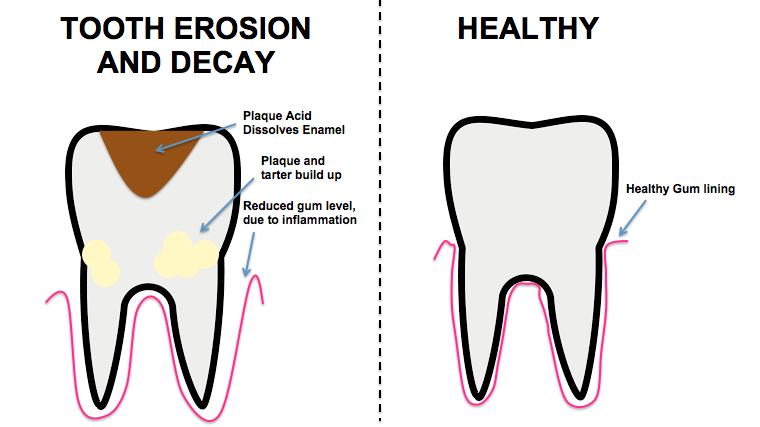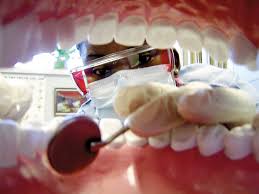No one likes to find out that they have a cavity. But if you have one, you know you should visit a dentist to have it fixed. But what is a cavity, exactly?
The simple answer is that a cavity is a hole in a tooth. This article will look at the answer in a little more depth.
A Cavity Starts with Bacteria
Everyone has germs and bacteria in their mouths. Some bacteria are good and actually help keep the acids in your mouth balanced. But other bacteria can be harmful. These bacteria gather together and form a sticky substance called plaque that coats the teeth.
Having plaque on your teeth is normal, but it can cause problems if it isn’t cleaned. Left alone, it will eventually eat away at the tooth and form a cavity. Thorough brushing and flossing are the best way to keep plaque from building up and causing a cavity.
We often think of cavities as a problem for children, but anyone at any age can get one. Young children, however, are not always good at brushing their teeth yet, so they might be more cavity-prone than others. It is very important to teach kids the proper way to brush and floss at an early age. If they practice good oral hygiene, they will be better at removing the plaque that can cause cavities.

What Happens if You Don’t Clean Plaque Off Your Teeth
If plaque stays on your teeth, the germs can cause tooth decay. The scientific term for tooth decay is dental caries. The word “caries” comes from a Latin word that means rotten!
The tooth decay grows and builds up until its acids start to attack the enamel of the tooth. The enamel is the hard coating on the tooth’s surface. It is very hard, but it’s not indestructible. The crevasses and bumps on the surface help you grind up your food when you chew. But they can also be good hiding places for food particles.
When the acids from the plaque start to soften this outer shell of the tooth, a tiny hole will form in the enamel. This is a cavity.
Take Care of Cavities Sooner Rather Than Later
If you have a very small cavity in the enamel of your tooth, you may not have any symptoms, but your dentist might find it with an X-ray. This is the best time to get your cavity filled. If you wait, the hole will grow bigger and deeper over time. Read this article to learn what to expect when you get a cavity filled.
While cavities are not “contagious,” they can spread to teeth that are next to or rub up against them during chewing. Where you once had one tiny cavity, you could end up with more.
Cavities Won’t Go Away by Themselves
 It may be tempting to leave the cavity alone and not have it filled, especially if you are worried about the pain and cost. But the cavity will not go away by itself. In fact, it can lead to even more serious problems. The article Do I Need to Get My Cavity Filled? explains why it’s best not to ignore a cavity.
It may be tempting to leave the cavity alone and not have it filled, especially if you are worried about the pain and cost. But the cavity will not go away by itself. In fact, it can lead to even more serious problems. The article Do I Need to Get My Cavity Filled? explains why it’s best not to ignore a cavity.
The bigger and deeper your cavity gets, the more likely you are to experience pain and discomfort. This is often because the cavity has eaten all the way through the enamel to the next level of your tooth – the dentin.
What Causes a Toothache?
The dentin is made up of tissue that is similar to enamel, but it is softer. Because it’s not as hard as enamel, when the bacteria that causes a cavity reaches it, it will start to spread and grow even faster.
The main purpose of the dentin is to protect the root of the tooth, which is sometimes called the pulp chamber. The pulp chamber contains nerves and blood vessels.
If the cavity makes its way down to the dentin, the opening allows acids, heat, and cold to make their way to the nerves. This can cause a toothache and sensitivity to hot or cold foods and liquids.
Don’t Wait Too Long to Fix a Cavity
Once the cavity has gotten this far, it is even more urgent that you have it filled. The minor discomfort you might feel from the procedure to fill it will stop the ongoing pain that you will have if you do nothing. If you’re concerned about the pain, this article will help.
The longer you wait to have a cavity filled, the more painful and expensive the treatment can be. Many people are worried about the cost of going to the dentist and having a cavity filled. Just like with the pain, the longer you wait, the worse it will get. The article How Much Does it Cost to Get a Cavity Filled? will answer that question.
Things You Can Do to Avoid Cavities
Luckily, there are things you can do to avoid getting cavities in the first place. By answering the question “What is a Cavity?” we’ve learned that the biggest cause is letting plaque stay on your teeth. Keeping up a routine of brushing and flossing correctly to remove plaque may be the best defense. Eating healthy and limiting sugary foods can also help.
You should also see a dentist for regular checkups. Cavities can be found early through regular examinations and x-rays. If you find them and fix them as soon as possible, further problems can be avoided. Having dental sealants applied to your teeth may be a good option for you too. If you need to find a dentist to have a cavity filled, this article will help you find one in three easy steps.
Now That You Know What a Cavity Is…
Hopefully, this article has answered the question “What is a cavity, exactly?” in a way that is easy to understand. Now that you know, you can take steps to avoid getting them in the first place. If you suspect that you have one, find a dentist near you right away to have him or her confirm and take steps to fix it..


